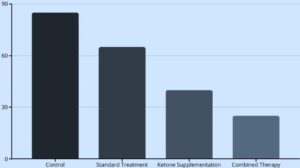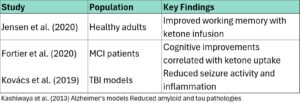Ketone Supplements
Exogenous Ketones:
Enhancing Brain Health and Cognitive Function
Exogenous ketones (ketones that are chemically identical to ketones produced by the body, but are provided as supplements), particularly 3-hydroxybutyrate (BHB), have emerged as a significant area of research for their potential in enhancing brain health and cognitive function.
Dr. Douglis has spent considerable time exploring the current research on the use and effects of exogenous ketones across different brain states: healthy brains, mild cognitive impairment (MCI), traumatic brain injury (TBI), and Alzheimer’s disease.
Learn more about the possible cognitive benefits of ketone supplements below.

Ketones and Brain Energy
Understanding Ketones as Brain Fuel
Ketones play a key role in several aspects of brain fuel, including…
Alternative Energy Source:
- BHB can rapidly cross the blood-brain barrier and serve as an effective alternative fuel source, particularly advantageous during states of low glucose availability, such as fasting or exercise.
Optimized Neuronal Metabolism:
- Under conditions of heightened cognitive demand, such as intense learning or memory tasks, the presence of ketones can optimize neuronal energy metabolism.
Dose-Dependent Response:
- Studies suggest that improved cognitive outcomes correlate directly with increased plasma ketone levels, further supporting the notion of ketones as cognitive enhancers.
Ketones and Brain Energy Metabolism
Blood-Brain Barrier Transport
- BHB rapidly crosses the blood-brain barrier via monocarboxylate transporters, making it readily available to brain cells. This efficient transport system allows ketones to serve as an immediate energy source for neurons in need.
Neuronal Uptake
- Neurons absorb ketones as an alternative fuel source through specialized transporters. Once inside the cell, ketones are processed differently than glucose, offering unique metabolic advantages.
Mitochondrial Processing
- Ketones are converted to acetyl-CoA for energy production within the mitochondria. This metabolic pathway becomes particularly important during states of low glucose availability or increased energy demand.
ATP Generation
- More efficient energy production compared to glucose metabolism, yielding more ATP per unit of oxygen consumed. Studies by Kovács et al. (2019) demonstrated that this alternative energy pathway can significantly enhance cognitive performance.
Metabolic Effects Supporting Brain Health
Insulin Sensitivity
- Ketones improve brain insulin signaling pathways, enhancing glucose regulation and metabolic function. This improved sensitivity may help protect against insulin resistance, which is increasingly linked to cognitive decline.
Cerebral Blood Flow
- Enhanced circulation delivers more oxygen and nutrients to brain tissues. Studies have shown that ketone metabolism can increase cerebral perfusion, particularly in regions associated with higher cognitive functions.
Neurotransmitter Balance
- Ketones influence GABA, glutamate, and acetylcholine levels, helping maintain optimal neurotransmitter balance. This regulation contributes to improved neural signaling and reduced excitotoxicity risk.
Blood-Brain Barrier Integrity
- Blood-Brain Barrier Integrity
Strengthened barrier function prevents harmful substances from entering the brain. Ketones appear to support the structural components of the blood-brain barrier, potentially reducing neuroinflammation.
Ketones Enhance Cognitive Abilities in Healthy Brains

Studies suggest that improved cognitive outcomes correlate directly with increased plasma ketone levels, further supporting the notion of ketones as cognitive enhancers. This dose-dependent effect indicates potential for targeted therapeutic applications. Research indicates that exogenous ketones may have the following cognitive benefits…
Cognitive Enhancement
Working Memory Improvement
- Studies show ketone supplementation enhances working memory performance in healthy adults. Effects are particularly notable during challenging cognitive tasks that require maintaining and manipulating information simultaneously.
Processing Speed
- Faster information processing observed with ketone supplementation. This may benefit complex cognitive operations and decision-making, allowing individuals to perform better in time-sensitive or high-pressure situations.
Mental Clarity
- Subjects report improved focus and reduced mental fatigue. These subjective improvements correlate with objective performance measures, suggesting real cognitive enhancement rather than merely perceived benefits.
Neuroprotection in Aging
- Regular ketone supplementation may slow age-related cognitive decline. This occurs through reduced oxidative damage and enhanced neuroplasticity, potentially preserving cognitive function as we age.
Executive Function Enhancement
Reasoning Problem-Solving Planning
Ketones support complex reasoning tasks by providing efficient energy to prefrontal cortex regions responsible for analytical thinking and logical deduction. This enhanced metabolic support may be particularly beneficial during extended periods of deep thinking.
Enhanced metabolic efficiency in neural networks leads to improved problem-solving capabilities, allowing for more creative and effective solutions. Ketones appear to support the flexible thinking necessary for addressing novel challenges.
Strategic planning abilities benefit from ketone-supported brain function, enabling better organization of thoughts and future-oriented thinking. This improvement may translate to enhanced project management, goal setting, and long-term decision making.
Executive functions represent higher-order cognitive processes that coordinate our thoughts and actions in service of goal-directed behavior. Research suggests that ketones may preferentially support these complex mental operations by providing optimal energy to the frontal cortex.
Cognitive Demand Enhancement
Intense Learning
- Ketones provide optimal energy during periods of intense study or learning. When the brain is actively forming new neural connections, ketone availability helps sustain the metabolic demands of this energy-intensive process.
Mental Endurance
- Cognitive stamina increases with ketone utilization during extended mental effort. This can translate to reduced mental fatigue and sustained performance during lengthy cognitive tasks or workdays.
Memory Tasks
- Complex memory formation and recall benefit from ketone-supported metabolism. The encoding, consolidation, and retrieval of information all require significant energy resources that ketones can efficiently provide.
Sustained Attention
- Focus and concentration improve with ketone availability during demanding tasks. The ability to maintain attention on relevant information while filtering out distractions appears to be enhanced by ketone metabolism.

Mild Cognitive Impairment (MCI) and Ketones
Mild Cognitive Impairment (MCI) represents a critical phase between normal cognitive aging and more significant neurodegenerative diseases, making it an important intervention point. Early metabolic support during this stage may help delay or prevent progression to more severe conditions.
Exogenous ketones provide an alternative energy source and address underlying metabolic dysfunction seen in MCI patients. This metabolic rescue approach targets the energy deficit that may contribute to cognitive decline.
Critical Evidence
In randomized controlled trials, participants taking ketogenic drinks demonstrated cognitive improvements directly associated with increased ketone uptake by the brain. These improvements were measurable on standardized cognitive.
How Ketones Work in Mild Cognitive Impairment
Enhanced Energy Availability
Ketones bypass impaired glucose metabolism pathways, providing crucial energy to neurons that may otherwise be undernourished in MCI conditions. This alternative fuel supply maintains ATP production and cellular function even when glucose utilization is compromised.
Reduced Neuroinflammation
BHB exhibits anti-inflammatory properties by modulating inflammatory processes in the brain, as demonstrated in studies by Roy et al. (2020). This reduction in neuroinflammation may help protect vulnerable neurons from inflammatory damage.
Amyloid Protection
Studies indicate that enhancing beta-hydroxybutyrate levels could reduce the adverse effects of amyloid-beta accumulation in the brain, a hallmark of Alzheimer’s pathology. This protection may occur through both direct interaction with amyloid and indirect metabolic effects.
Benefits for Mild Cognitive Impairment
Cognitive Rescue
In randomized controlled trials, such as those conducted by Fortier et al., participants taking a ketogenic drink demonstrated cognitive improvements that were directly associated with increased ketone uptake by the brain. These improvements spanned multiple cognitive domains.
Metabolic Support
Exogenous ketones not only provide an alternative energy source but also address the underlying metabolic dysfunction seen in MCI, potentially slowing progression to more severe cognitive decline. This metabolic support helps maintain neuronal function.
Reduced Neuroinflammation
BHB exhibits anti-inflammatory properties by modulating inflammatory processes in the brain, which may contribute to cognitive preservation in individuals with early signs of impairment. Chronic neuroinflammation is increasingly recognized as a driver of cognitive decline.
Amyloid-Beta Reduction in MCI
Amyloid Accumulation
Studies indicate that enhancing beta-hydroxybutyrate levels could reduce the adverse effects of amyloid-beta accumulation in the brain, a hallmark of Alzheimer’s pathology. This protective effect may help preserve cognitive function despite early pathological changes.
Reduced Pathology
Research by Kashiwaya et al. (2013) demonstrated that ketone supplementation can lead to measurable reductions in amyloid burden in experimental models. This suggests potential for disease-modifying effects beyond symptomatic improvement.
Ketone Intervention
Exogenous ketones provide alternative energy while potentially interfering with amyloid aggregation processes through metabolic pathway modulation. This dual action addresses both the energy crisis and the pathological protein accumulation.

Protective Benefits of Ketones in Traumatic Brain Injury (TBI)
Ketones play a potentially significant role in traumatic brain injury (TBI) recovery by providing an alternative energy source for the brain, which often experiences impaired glucose metabolism post-injury. TBI can trigger inflammation and related damage, contributing to additional brain injury. Ketones help mitigate these harmful processes by modulating inflammatory pathways and enhancing antioxidant defenses. This means that ketones could help to improve cellular function, reduce neuronal damage, and promote healing in the injured brain, making them a promising area of research for TBI recovery.
Protective Effects of Ketones in TBI
Mitochondrial Support
BHB increases mitochondrial ATP production, critical in maintaining cellular energy homeostasis during recovery after injury. This enhanced energy availability helps damaged neurons survive and recover functionality, potentially limiting the extent of permanent damage.
Anti-inflammatory Action
The anti-inflammatory effects of ketones help reduce the neuroinflammatory response following TBI, subsequently leading to better functional recovery in various experimental models. This modulation of inflammation may be particularly important in the acute phase after injury.
Seizure Reduction
Kovács et al. highlighted that exogenous ketone supplementation could lead to reduced seizure activity induced by inflammatory agents, suggesting potential therapeutic roles in managing secondary effects of brain injuries.
Traumatic Brain Injury Protection
Functional Recovery
Improved clinical outcomes are observed in TBI models treated with exogenous ketones. These improvements include better cognitive performance, reduced motor deficits, and faster return to baseline function compared to controls without ketone supplementation.
Reduced Inflammation
Decreased neuroinflammatory response following ketone administration helps limit secondary damage after the initial injury. This anti-inflammatory effect may be particularly important in the acute phase when inflammation can exacerbate tissue damage.
Cellular Protection
Maintained energy homeostasis supports cellular survival during the critical period after injury. When cells can maintain adequate ATP production despite injury-related metabolic disruption, they have a better chance of surviving and recovering function.
Mitochondrial Support
Increased ATP production through ketone metabolism helps maintain cellular function when normal energy pathways are compromised. This mitochondrial support is crucial, as mitochondrial dysfunction is a key feature of traumatic brain injury.
Seizure Reduction Following TBI
Post-Injury Seizures
Traumatic brain injuries often lead to increased seizure susceptibility due to neural circuit disruption and inflammatory processes. These seizures can further complicate recovery and contribute to secondary damage in the brain.
Ketone Protection
Kovács et al. highlighted that exogenous ketone supplementation could lead to reduced seizure activity induced by inflammatory agents in experimental animals. This protective effect appears to be dose-dependent and most effective when treatment begins early.
Neural Stability
BHB appears to stabilize neural membranes and modulate excitatory neurotransmission, potentially preventing the hyperexcitability that leads to seizures. This stabilizing effect may help normalize disrupted neural circuits following injury.
Seizure Reduction in TBI Clinical Results
Post-traumatic seizures represent a significant complication following traumatic brain injury, affecting both short-term recovery and long-term outcomes. These seizures often result from neural circuit disruption, excitotoxicity, and inflammatory processes triggered by the initial trauma.

Kovács et al. highlighted that exogenous ketone supplementation could lead to reduced seizure activity induced by inflammatory agents in experimental animals. This suggests potential therapeutic roles for exogenous ketones in managing secondary effects of brain injuries, particularly post-traumatic seizures which can complicate recovery.
The mechanism appears to involve multiple pathways: stabilization of neural membranes, modulation of excitatory and inhibitory neurotransmitter balance, and reduction of inflammatory mediators that contribute to hyperexcitability. This multi-faceted approach may offer advantages over traditional anti-seizure medications.

Ketones in Alzheimer’s Disease
The Glucose Problem
Evidence suggests that the brains of Alzheimer’s patients exhibit reduced glucose metabolism, which is thought to exacerbate cognitive decline. This metabolic deficit creates an energy crisis in neurons, contributing to cellular dysfunction and death.
By providing ketones as an alternative energy source, researchers hope to address the fundamental energy crisis in Alzheimer’s brains, potentially slowing disease progression and improving cognitive function.
Ketones have been proposed as a supplementary fuel source capable of bypassing neuronal energy deficits caused by impaired glucose transport. This alternative energy pathway may help sustain neuronal function despite glucose utilization problems.
Ketones Against Alzheimer's Pathology
Metabolic Resilience
Ari et al. provided evidence supporting altered metabolic profiles in response to ketone supplementation, indicating potential resiliency against Alzheimer’s pathology. This metabolic adaptation may help neurons survive despite the challenging environment of the Alzheimer’s brain.
Neuronal Survival
Mechanisms that involve lowering neurotrophy-related apoptosis and enhancing neuronal survival rates have been observed with ketone supplementation. This improved survival may help preserve brain function even in the presence of pathological changes.
Amyloid Reduction
Studies have shown that administering a ketogenic diet or exogenous ketones can reduce amyloid pathologies in preclinical models of Alzheimer’s disease. This reduction in toxic protein accumulation may help slow disease progression.
Tau Pathology Improvement
Research indicates potential benefits in reducing tau tangles, another hallmark of Alzheimer’s disease, through ketone-based interventions. The dual effect on both major pathological features makes ketones particularly promising.
Alzheimer's Disease Mechanisms and Ketone Intervention
Glucose Hypometabolism
Alzheimer’s brains show reduced ability to utilize glucose, creating an energy deficit in neurons that contributes to cognitive decline and neurodegeneration. This metabolic failure appears to precede clinical symptoms by years or even decades.
Reduced Pathology
Studies show that ketogenic interventions can reduce amyloid and tau pathologies in preclinical models, possibly through mechanisms that involve lowering neurotrophy-related apoptosis. This suggests potential disease-modifying effects.
Enhanced Neuronal Survival
Ketones support neuronal resilience by altering metabolic profiles, indicating potential protection against Alzheimer’s pathology progression. This metabolic flexibility may help neurons withstand the challenging conditions of the disease.
Ketone Supplementation
Administering exogenous ketones provides an alternative energy substrate that can be utilized by neurons even when glucose metabolism is impaired. Unlike glucose transport, ketone transport mechanisms remain relatively intact in Alzheimer’s disease.
Research Evidence and Clinical Applications
The growing body of research supports exogenous ketones as a versatile intervention across various neurological conditions. Clinical applications are expanding from experimental treatments to more mainstream therapeutic approaches as evidence accumulates.
Ketone Alzheimer's Research
Here’s a sample of the research behind this section on ketones and Alzheimer’s Disease.

Conclusion:
The Versatile Potential of Exogenous Ketones
Evidence suggests that the brains of Alzheimer’s patients exhibit reduced glucose metabolism, which is thought to exacerbate cognitive decline. This metabolic deficit creates an energy crisis in neurons, contributing to cellular dysfunction and death.
By providing ketones as an alternative energy source, researchers hope to address the fundamental energy crisis in Alzheimer’s brains, potentially slowing disease progression and improving cognitive function.
Ketones have been proposed as a supplementary fuel source capable of bypassing neuronal energy deficits caused by impaired glucose transport. This alternative energy pathway may help sustain neuronal function despite glucose utilization problems.
Clinical Applications
Exogenous ketones show promise as therapeutic interventions for various neurological conditions, from mild cognitive impairment to traumatic brain injury and Alzheimer’s disease. Their ability to address fundamental metabolic processes makes them uniquely positioned to target multiple aspects of brain health simultaneously.
Neuroprotection
The neuroprotective effects of ketones extend beyond simple energy provision. Through anti-inflammatory action, antioxidant effects, and modulation of neural signaling, ketones create a comprehensive defense against injury and degeneration. This multi-faceted protection may help preserve brain function in challenging conditions.
Cognitive Support
The enhancement of mental performance observed with ketone supplementation spans multiple cognitive domains, including working memory, executive function, and processing speed. These benefits appear in both healthy individuals and those with cognitive challenges, suggesting broad applicability.
Alternative Energy
Perhaps most fundamentally, ketones provide an alternative metabolic pathway that bypasses impaired glucose metabolism. This ability to serve as an efficient fuel source addresses the energy crisis that underlies many neurological conditions and may support optimal brain function even in healthy individuals.
Call Us Today to schedule an appoitment to discuss how Exogeneous Ketones might benefit your health!
*These statements have not been evaluated by the Food and Drug Administration. These products are not intended to diagnose, treat, cure, or prevent any disease.
